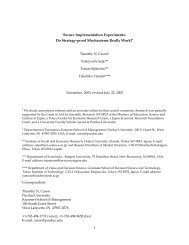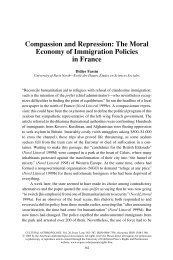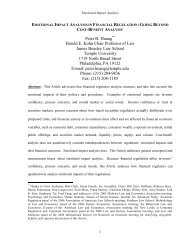Governance, Growth, and Development Decision-making - School of ...
Governance, Growth, and Development Decision-making - School of ...
Governance, Growth, and Development Decision-making - School of ...
You also want an ePaper? Increase the reach of your titles
YUMPU automatically turns print PDFs into web optimized ePapers that Google loves.
thinking about how to build the rule <strong>of</strong> law in a society, enhance its<br />
voice <strong>and</strong> accountability, or control corruption at large.<br />
So my bottom line for economists in the business <strong>of</strong> <strong>of</strong>fering<br />
advice on governance-as-an-end would be simple: don’t do it!<br />
2. <strong>Governance</strong> as a Means<br />
<strong>Governance</strong> has instrumental value ins<strong>of</strong>ar as it provides producers<br />
<strong>and</strong> households with greater clarity on the rules <strong>of</strong> the game <strong>and</strong> investors<br />
with greater assurance that they can appropriate the returns<br />
to their efforts. That is the essential point that the institutions-<strong>and</strong>growth<br />
literature has emphasized. It is also the main rationale for<br />
thinking <strong>of</strong> governance reform in the context <strong>of</strong> growth strategies.<br />
The long-run association between good governance <strong>and</strong> high<br />
incomes is incontrovertible. The existence <strong>of</strong> a causal link from the<br />
former to the latter is now also widely accepted. What is less well<br />
understood is that this long-run association provides very little<br />
guidance for appropriate strategies to induce high growth. It certainly<br />
does not suggest we can systematically rely upon improved governance<br />
to generate increased growth over the time horizons that<br />
policy makers <strong>and</strong> their advisors care about (a decade or two). I am<br />
not aware <strong>of</strong> any strong econometric evidence that relates st<strong>and</strong>ard<br />
governance criteria to growth (all the evidence is about income levels).<br />
And there are enough countries that are growing rapidly despite<br />
poor governance—China, Vietnam, Cambodia to name some <strong>of</strong> the<br />
prominent Asian examples—to render suspect any general claim to<br />
the contrary. Indeed, we should take it as good news that large-scale<br />
institutional transformation—<strong>of</strong> the type entailed by the governance<br />
agenda—is hardly ever a prerequisite for getting growth going.<br />
This may seem paradoxical at first sight, but it should not be.<br />
Poor countries suffer from a multitude <strong>of</strong> constraints, <strong>and</strong> effective<br />
growth policies are those that address the most binding among<br />
them. Poor governance in general may be the binding constraint<br />
in Zimbabwe <strong>and</strong> some others, but it apparently was not in China,<br />
Vietnam, or Cambodia, <strong>and</strong> it most surely is not in Ethiopia, South<br />
Dani Rodrik 19
















